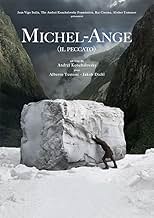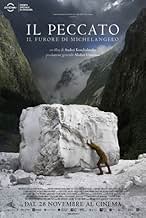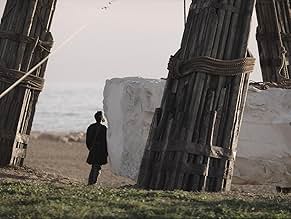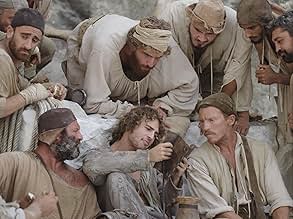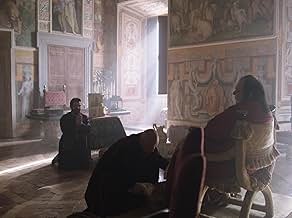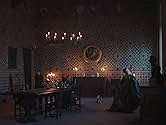Il peccato
- 2019
- 2 h 14 min
AVALIAÇÃO DA IMDb
6,8/10
1,5 mil
SUA AVALIAÇÃO
A vida de Michelangelo Buonarroti.A vida de Michelangelo Buonarroti.A vida de Michelangelo Buonarroti.
- Direção
- Roteiristas
- Artistas
- Prêmios
- 3 vitórias e 2 indicações no total
- Direção
- Roteiristas
- Elenco e equipe completos
- Produção, bilheteria e muito mais no IMDbPro
Avaliações em destaque
Knowledge. Loyalty. Truthfulness. Guilt. Perseverance. Effort. Strength. Love. Spirituality.
If you want to learn a thing or two about the above, it's a must to watch.
As a biopic about Michelangelo, it will most likely leave you with more questions about the man that you initially had. The narrative is very cryptic and revolves around him trying to balance his art around commissions and orders he has no hope of actually fulfilling.
Most of the movie is spent on "the monster," a marble block he considers more important than any of his responsibilities or desires. But when it comes down to actually watching the transportation, it is just an accident waiting to happen. You know that it's coming, and yet it is surprising nonetheless when it does.
The plot is stitched with bits and pieces of his life and relationships with multiple Popes he lived through. It only makes sense if you already know anything there is to know about his biography. The movie will not bother establishing differences between the pope factions or highlighting the significance of the events. You are on your own in this one.
His character also becomes more confusing as it goes along, his clear perfectionism and suspicion of everyone stem from vaguely alluded conspiracies around him that start and end abruptly, sometimes in the same scenes. His obsession with the monster and willingness to betray everyone and everything for it is captivating, however, his revelation at the end just seems way too nebulous for it to be understood by anyone except him, and maybe this is how it should be. The best aspect of Michelangelo that the movie so carefully and authentically portrays is that, despite looking like a local madman who has to beg on a street, he was never poor; his tight-fistedness is something of a legend in and of itself. Including a chest full of ducats under his bed that he just doesn't spend while living in what amounts to poverty.
Speaking of which, the mise-en-scene of the medieval cities is impeccable. It's one of those ultra-authentic dirty movies that doesn't resort to erasing color everywhere to show the dirt. No, everything can be vibrant while the roads are made of layers upon layers of mud. That's not a contradiction. Everyone is sweaty with their unwashed clothes full of holes and tears. All this only highlights the absolute beauty of his creations.
Most of the movie is spent on "the monster," a marble block he considers more important than any of his responsibilities or desires. But when it comes down to actually watching the transportation, it is just an accident waiting to happen. You know that it's coming, and yet it is surprising nonetheless when it does.
The plot is stitched with bits and pieces of his life and relationships with multiple Popes he lived through. It only makes sense if you already know anything there is to know about his biography. The movie will not bother establishing differences between the pope factions or highlighting the significance of the events. You are on your own in this one.
His character also becomes more confusing as it goes along, his clear perfectionism and suspicion of everyone stem from vaguely alluded conspiracies around him that start and end abruptly, sometimes in the same scenes. His obsession with the monster and willingness to betray everyone and everything for it is captivating, however, his revelation at the end just seems way too nebulous for it to be understood by anyone except him, and maybe this is how it should be. The best aspect of Michelangelo that the movie so carefully and authentically portrays is that, despite looking like a local madman who has to beg on a street, he was never poor; his tight-fistedness is something of a legend in and of itself. Including a chest full of ducats under his bed that he just doesn't spend while living in what amounts to poverty.
Speaking of which, the mise-en-scene of the medieval cities is impeccable. It's one of those ultra-authentic dirty movies that doesn't resort to erasing color everywhere to show the dirt. No, everything can be vibrant while the roads are made of layers upon layers of mud. That's not a contradiction. Everyone is sweaty with their unwashed clothes full of holes and tears. All this only highlights the absolute beauty of his creations.
Nice work with beautiful scenes recreating the atmosphere of those times perfectly well.
Michaelangelo was a genius sculptor and each of his creations move the soul even of modern people, lots of whom have hardly any taste of art at all. This film is artistic enough, beautiful and talented, made by a very professional director of soviet school. Just the right background to tell a story of a genius.
No soundtrack can also mean no noise pollution. I enjoyed everything about this movie
Watching this film you might wonder "What on Earth this has to do with Michelangelo, except for the decorations?"
While it is a good idea to try a character and period study, rather than a glamorous Hollywood-style biopic, this film is a blank shot at it. On the one hand the cast is interesting, the non-professional actors play well (though such cast would fit better Boccaccio's "Decameron"). The film overall slightly reminds films by Fellini or Milos Forman's "Amadeus" - where there are many grotesque moments, the main character could be almost a caricature but Forman unlike Konchalovsky manages very well the contrast between comical and tragic. In the "Sin" the grotesque is purposeless, because the script is very weak, the storytelling is not engaging and the main character never steps out from the void of half-craziness. In Forman's film Mozart could look dumb, but as soon as music started he turned into a genius. Konchalovsky's Michelangelo only counts coins, argues contracts and purchases marble. He never touches a chisel or brush, he is never shown as a thinker or a poet. There is no moment to sympathize with him or understand why such person could create great art. It is an empty caricature rather than a human.
To sum up, this film is an unfortunately waste of promising actors and excellent Tuscan scenery. Some snapshots are well done because the cast and the decorations are good. But overall you will not gain much by watching this half-baked production, unless you are interested in evolution of Konchalovsky as a director.
While it is a good idea to try a character and period study, rather than a glamorous Hollywood-style biopic, this film is a blank shot at it. On the one hand the cast is interesting, the non-professional actors play well (though such cast would fit better Boccaccio's "Decameron"). The film overall slightly reminds films by Fellini or Milos Forman's "Amadeus" - where there are many grotesque moments, the main character could be almost a caricature but Forman unlike Konchalovsky manages very well the contrast between comical and tragic. In the "Sin" the grotesque is purposeless, because the script is very weak, the storytelling is not engaging and the main character never steps out from the void of half-craziness. In Forman's film Mozart could look dumb, but as soon as music started he turned into a genius. Konchalovsky's Michelangelo only counts coins, argues contracts and purchases marble. He never touches a chisel or brush, he is never shown as a thinker or a poet. There is no moment to sympathize with him or understand why such person could create great art. It is an empty caricature rather than a human.
To sum up, this film is an unfortunately waste of promising actors and excellent Tuscan scenery. Some snapshots are well done because the cast and the decorations are good. But overall you will not gain much by watching this half-baked production, unless you are interested in evolution of Konchalovsky as a director.
10whotheff
Instead of being 24 pictures per second, this movie is 24 paintings per second. Contrary to modern cinema camera is very still. Instead of boring, static actors, we have static frames with a lot of movement in them with perfect angles for every single shot. It was so full of atmosphere, 100% realism and natural sounds that I did not blink for two hours. But instead of being some fancy art film, it tells a story which is very passionate, moving, dynamic. The protagonist lives through heaven and hell in following hos passion and this is so natural and real, that combined with the perfect atmosphere and realism, it made me feel as if I was there with him. And I've seen quite a lot of movies and hard to impress. Every scene, every inch of the screen, every sound, every second has meaning. Even quiet, still shots are felt so heavy, that there is no doubt you would feel them too.
The feeling of the age is so true, everything is so analog. As if no computer was used in the making of this film. I can only imagine the tons of hard work put into it to create this realism. Now I want to see more of Konchalovsky!
The feeling of the age is so true, everything is so analog. As if no computer was used in the making of this film. I can only imagine the tons of hard work put into it to create this realism. Now I want to see more of Konchalovsky!
Você sabia?
- CuriosidadesShot entirely in Italy. The movie was shot in Rome and its environs and in Tuscany, including at the Carrara quarry where Michelangelo got his marble.
- Citações
Michelangelo Buonarroti: Money always rubs elbows with infamy.
- ConexõesReferenced in Vecherniy Urgant: Andrei Konchalovsky/Pompeya (2019)
Principais escolhas
Faça login para avaliar e ver a lista de recomendações personalizadas
- How long is Sin?Fornecido pela Alexa
Detalhes
Bilheteria
- Orçamento
- € 15.000.000 (estimativa)
- Faturamento bruto mundial
- US$ 243.043
- Tempo de duração2 horas 14 minutos
- Cor
- Proporção
- 1.33 : 1
Contribua para esta página
Sugerir uma alteração ou adicionar conteúdo ausente

![Assistir a Trailer [OV]](https://m.media-amazon.com/images/M/MV5BYThkZDVkMGQtNGZiYS00NzMwLWFkOWUtYTFhYThiN2E4MTQwXkEyXkFqcGdeQXRyYW5zY29kZS13b3JrZmxvdw@@._V1_QL75_UX500_CR0)
